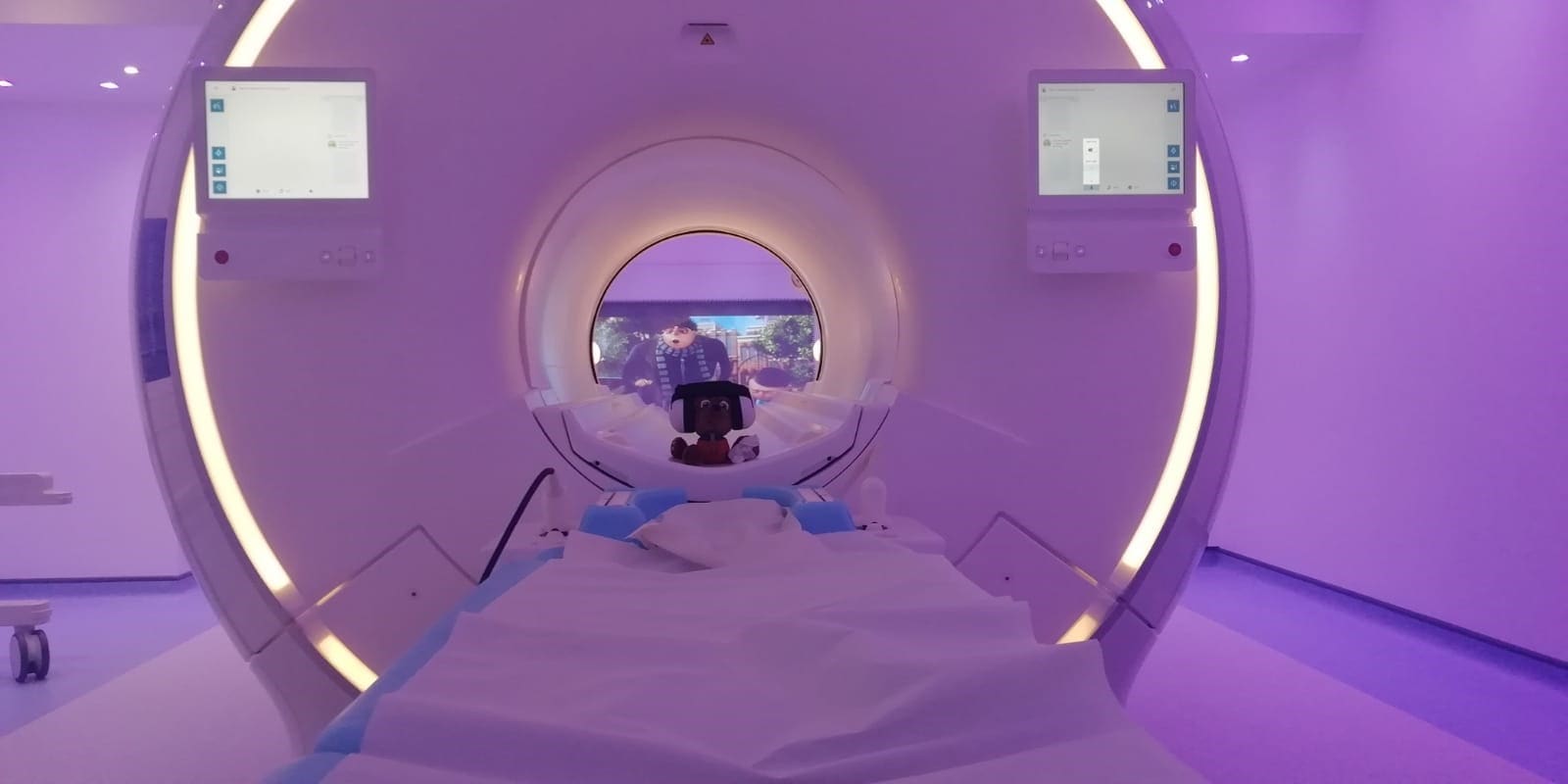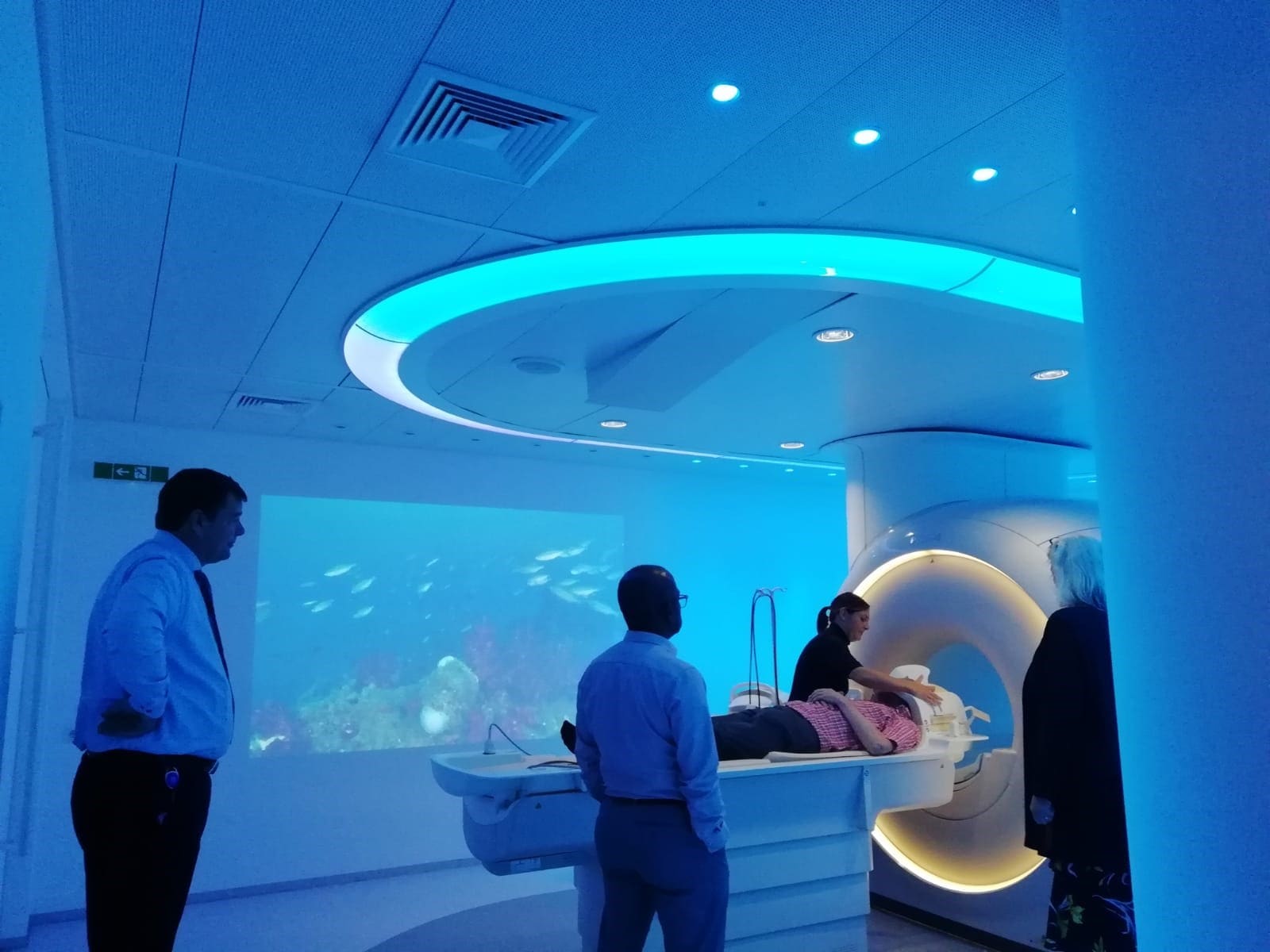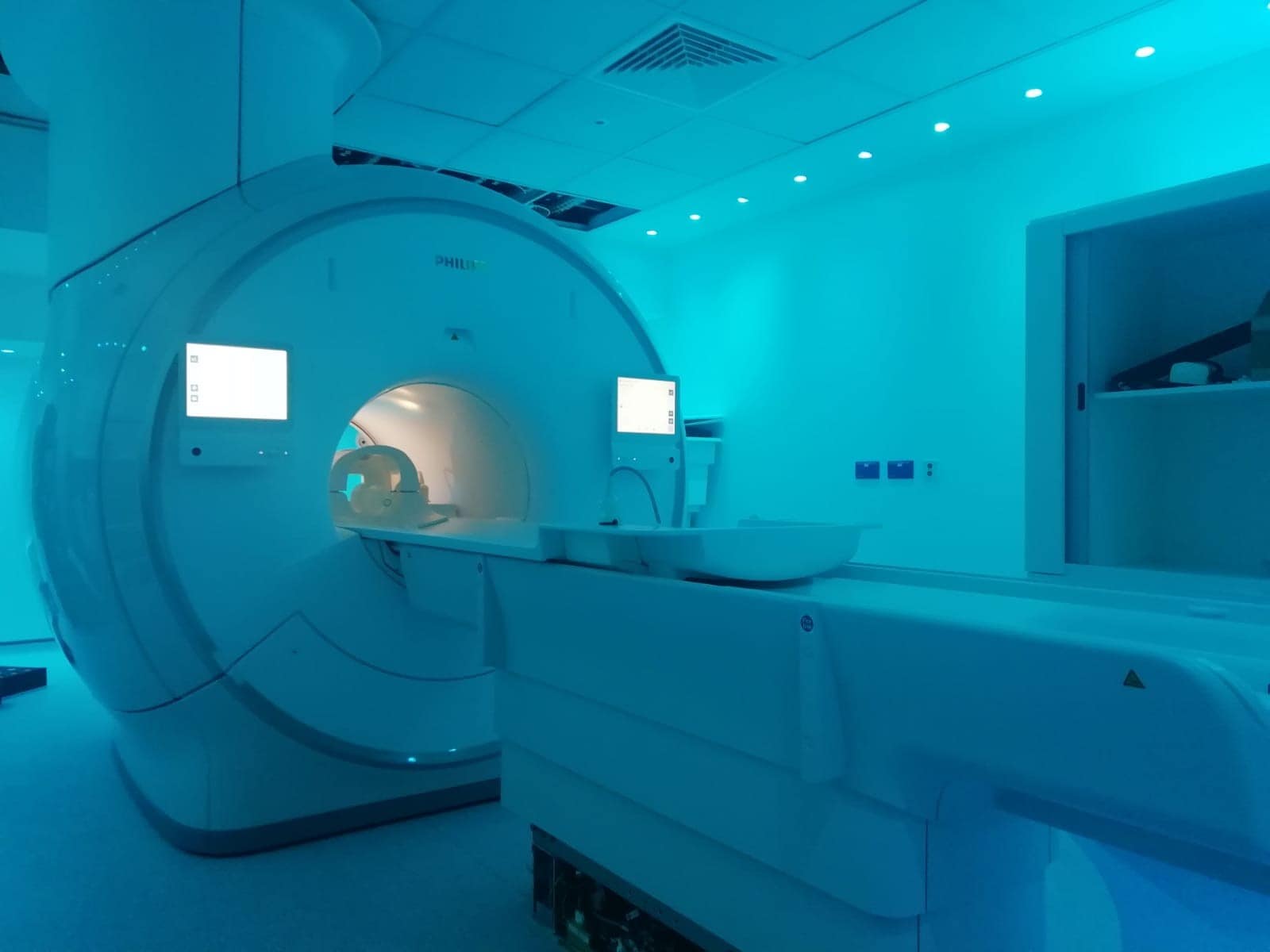Jul 05, 2021
Realising the value of innovation at Poole Hospital, University Hospitals Dorset NHS Foundation Trust
Farnborough, United Kingdom – Royal Philips (NYSE: PHG, AEX: PHIA), MRI scans have long been a crucial part of the diagnosis and treatment journey for millions of patients who pass through our hospitals’ doors every year. As England’s population has aged and more people live with comorbidities, the number of MRI scans being conducted across the country has accelerated. The data bears this out; between 2012 and 2016, MRI scans performed in England grew by 8.9% (2012/13: 2.35 million; 2016/17: 3.36 million). This growth has compounded pressure on radiologists, whose workloads increased by as much as 30% during a similar period (2012 and 2017)i. Fast-forward three years, in 2020 and through to 2021, the COVID-19 pandemic led to an unforeseen slowdown in diagnostics and treatments. Hundreds of thousands of people in England have been forced to wait more than six weeks for one of 15 standard diagnostic tests – including MRI, and even more have seen treatments postponedii. Despite this, MRI scans remain an essential part of the treatment journey for millions of patients. In total, 3.36 million scans are performed in the UK every yeariii – costing the NHS almost £450 millioniv. An important element behind these rising costs is the price of helium, an increasingly finite gas used as a cooling agent in MRI scanners. Recent estimates predict that the earth could run out of its helium supply in as little as 25-30 yearsv, creating an increasing need for more sustainable approaches to the use of the gas in MRI technology. As the burden of COVID-19 reduces, the need for innovative and effective diagnostic tools increases, to ensure the NHS can manage the resurgence in standard procedures and enabling patients to receive timely care – whilst also deploying solutions which can be managed much more sustainably.
Two years on: Poole Hospital Against this backdrop, in 2019 Poole Hospital became the first UK hospital to introduce the Philips Ingenia Ambition X 1.5T MR - the UK’s first helium-freevi MR operations system. With growing patient demand and growing helium shortage, the Trust were searching for solutions that enabled them to sustainably scale up their services. Based on a decade of innovation, the Ingenia Ambition X 1.5T MR operates with only seven litres of liquid helium, instead of the usual 1,500 litres in conventional MR system designs, with the fully sealed BlueSeal magnet. This is particularly important considering the rising costs of helium, which grew by nearly three quarters in 2021 to £15.49 a litre compared to £11.61 a year previous. Furthermore, the Philips BlueSeal magnet uses a highly efficient, new micro-cooling technology. It is fully sealed, so no helium can escape, either suddenly during a loss of field or gradually. As a result, this technology has a significant impact on the long-term continuity, security and cost of MR operations. Dr Ravi Ayer, Poole Hospital Consultant Radiologist: “We are very proud to be the first NHS trust in the UK to offer our patients this breakthrough MR technology. The Ingenia Ambition X not only ensures high quality diagnostic care but also all but eradicates potentially costly disruptions to service when helium doesn’t remain cool enough to work with. MR technology is a high-level investment that needs frequent use to ensure return on investment, so removing this problem is of great appeal to the team. And vitally, it will support us to see more patients more quickly, without compromising quality. This is a new approach to diagnostic imaging and exactly the kind of service we are proud to bring to our community.” Introducing comfort and easing anxiety for patients Having an MRI scan can be daunting for many patients; some may feel anxiety about the process or struggle with claustrophobia. The patient experience has informed the design and build of the Ingenia Ambition X from the very start. Eliminating these concerns for patients has been a Philips goal from the beginning. For example, many patients who would have previously needed general anaesthetic are able to tolerate the scan without sedatives. Furthermore, the screening can also be well tolerated by children as young as 3 years old and those with autism. Philips has created an ambient experience, including screens on the back wall of the system to play media and the introduction of soothing music through headphones. Prior to the installation of the Ingenia Ambition X at Poole, many diagnostic tests required children to go under general anaesthetic, which can lead to nausea and temporary mood changes or worse, the requirement to take time off school or nursery following the anaestheticvii. Using the Ingenia Ambition X, alongside the expertise of radiographers and play therapists, children can receive a scan without these inconvenient side effects.
Relaxing and the best MRI experience I have had. Over and done with before I had a chance to think about it.”
Kelly Merrick
I’ve had numerous MRI scans over the last 10 years and this been the best experience, having had a mirror and seeing the radiographers previously. The timeline at the bottom of the screen gave a good indication of progress. Excellent innovation.”
Corin Gordon
My daughter had an MRI scan and although she was very nervous, being able to listen and watch a movie made the whole experience a pleasant one. It was noisy but not as noisy as I expected. Technology never ceases to amaze me.”
Beverley Moore / Abigail Moore
Benefit for clinicians For too long MRI machines have required multiple clinicians and healthcare workers to set up the system for each patient. In designing the Ingenia Ambition X, Philips applied the latest technologies and insights from clinicians to develop a machine operable by just one MRI radiographer, with a second MRI radiographer present for safety reasons. The software used guides an MRI radiographer through an intuitive programme, in turn improving workflow and freeing up wider clinician resources. For MRI radiographer teams this is revolutionary. Not only does each machine save money for the hospital and reduce finite gas use, it frees up vitally important clinician capacity. Together with Philips Compressed SENSE technology, the Ingenia Ambition X can speed up exam times by up to 50%, meaning patients spend less time being scanned with no compromise on image qualityviii. According to Consultant Radiologist Dr Ravi Ayer, “Philips lead the way when it comes to better imaging and better patient care. A people-centric approach which takes into consideration all elements of the ambient experience and environmental wellness of the patient also creates a more productive and efficient process, by reducing patient stress levels and increasing more first-time right imaging.” Studies have shown that Philips Compressed SENSE technology allows hospitals to scan more than five extra patients per day within the same scanning hours enabling clinicians to reduce patient backlogix. Dr Ayer continued to say, “Other specialties put on clinics for their backlogs, they’ll put in evening and weekday clinics, meaning many patients come into have scans. Often the scans are to diagnose cancer so have to be done within two weeks.” However, it is a different story at Poole. “We are able to prioritise scanning some of the most unwell and challenging inpatients on the Ambition thus enabling us to deal with the increased amount of imaging arising from these additional clinics.” Despite the postponement of MRI scans during the height of COVID-19, Poole Hospital has since reduced backlogs and waiting times in 2021. The hospital is now averaging an extra 30 patients scanned per month this year, compared to 2020. MRI Deputy Superintendent Radiographer, Aleksandra Kudyk also discussed the value the Ingenia Ambition X brings with treating older age patients. “Every year we see an increase of patients with pacemakers and implants. With ScanWise Implant we can easily adopt all those conditions and meet criteria. We scan the majority of pacemaker patients on Ambition because it is so simple. I have confidence my patient is safe and we know the implant will still work after the scan.” For clinicians it is also essential to provide comfort to patients. MRI Deputy Superintendent Radiographer, Aleksandra Kudyk speaks passionately about this. “Every day we have patients who are very thankful for the experience. For us as radiographers it is a game changer, it is a completely different way of working. We can clean everything in between patients and we can keep the environment safe”. Charlie McCaffrey, Philips UKI Health Systems Lead: “The MRI was invented in the UK, so it is fitting that the UK has introduced another imaging first at Poole Hospital. “Philips has long been committed to making the world both healthier and more sustainable through meaningful innovation, and these values come together in the Ingenia Ambition X. Helium is a finite resource, with a large proportion being used in MR imaging scanners across the world. I am proud that we can offer this breakthrough technology that not only supports more patients in getting the care they need but also does so in such a way that enables greater respect for the limited resources on Earth. “We are looking forward to strengthening our relationship with the team at Poole and bringing a new era of MR to the Trust.” Delivering value for the NHS MRI machines are just one component of a vast array of medical technologies that play a role in delivering high quality diagnostics and care to patients in England. Philips sits at the centre of ensuring innovations in this area continue. Providing a more comfortable and efficient experience for patients goes hand in hand with delivering services sustainably. The Ingenia Ambition X is a breakthrough innovation in this regard. Combining a new patient journey with innovative technology that eliminates critical but finite resources, means NHS trusts can deliver better care and save money. References i https://www.bbc.co.uk/news/health-45275071 ii https://www.bmj.com/content/373/bmj.n995 iv Based on the average MRI scan costing £130 - https://femanin.com/2020/01/15/how-much-have-i-cost-the-nhs/#:~:text=MRI%20Scan%20%E2%80%93%20%C2%A3130&text=MRI's%20scan%20pretty%20much%20any,blood%20vessels%20and%20internal%20organs. v https://www.thoughtco.com/will-we-run-out-of-helium-3975959 vi The Ingenia Ambition 1.5T contains less than 0.5% of the helium of a conventional system and this is permanently sealed inside the device – record on file with Philips Healthcare viii Using Compressed SENSE technology and compared to Philips exams without Compressed SENSE – record on file with Philips Healthcare
About Royal Philips
Royal Philips (NYSE: PHG, AEX: PHIA) is a leading health technology company focused on improving people's health and well-being and enabling better outcomes across the health continuum – from healthy living and prevention, to diagnosis, treatment and home care. Philips leverages advanced technology and deep clinical and consumer insights to deliver integrated solutions. Headquartered in the Netherlands, the company is a leader in diagnostic imaging, image-guided therapy, patient monitoring and health informatics, as well as in consumer health and home care. Philips generated 2020 sales of EUR 17.3 billion and employs approximately 77,000 employees with sales and services in more than 100 countries. News about Philips can be found at www.philips.com/newscenter.
Topics
Contact Details Emily Wells-Burr Integrated Communications Manager Tel: + 44 (0) 7825 105 685 Email: [email protected]











